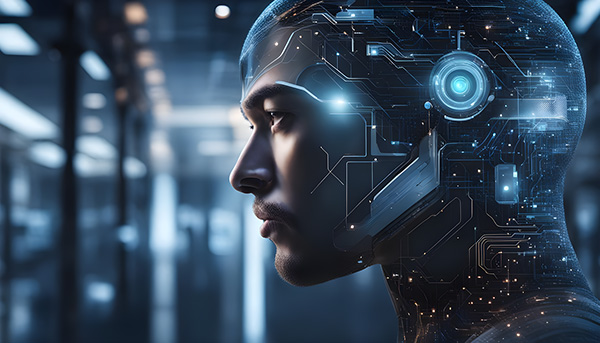Learn how humans and AI can forge an ethical, symbiotic relationship by viewing AI as a partner, not just a tool or threat.
By Ed Watal, Founder – Intellibus
As artificial intelligence (AI) capabilities rapidly advance, there are growing concerns about its potential impacts on humanity. However, rather than viewing AI as a threat, we must recognize the immense opportunity it presents to create a collaborative, symbiotic relationship between humans and machines. By embracing AI as a partner, not just a tool, we can enhance human abilities and creativity for the benefit of all, and recognize it for what it is: a technological breakthrough.
This symbiotic relationship is built on continuous learning between humans and AI, leading to novel innovations, deeper insights, and previously unimaginable progress. To achieve this future, both humans and AI systems must adapt to each other, combining AI’s speed and precision with human judgment, ethics, creativity, and emotional intelligence. The result is a dynamic partnership where each side augments and elevates the other’s capabilities.
The path forward requires focusing AI advancement on collaborative goals, designing systems that align with human values, and maintaining active participation in guiding AI to benefit society. By working together, AI and humans can achieve far more than either could alone. The time is now to shape an intelligent, ethical and symbiotic future where AI enhances how we live and work.
One of the most powerful ways AI can enhance human capabilities is through collaboration. AI excels at handling large volumes of data, automating routine tasks, and optimizing complex systems. For example, in the manufacturing industry, it helps companies become more efficient and avoid human error. This allows humans to focus their time and energy on more creative, strategic endeavors that leverage uniquely human strengths like emotional intelligence, ethics, imagination, and ingenuity. This symbiotic partnership enables enhanced productivity, breakthrough innovations, and new solutions to complex problems. With AI accelerating and augmenting human skills, we can achieve levels of progress previously unimaginable, including major technological breakthroughs.

Emotional intelligence is a uniquely human capability that allows us to understand and respond to emotions, needs, and social cues. Integrating emotional intelligence into AI systems can profoundly enhance their ability to interact with and serve people. In fields like customer service, healthcare, education and more, AI that can perceive and adapt to human emotions and values creates more natural, intuitive relationships between humans and machines. This emotional awareness makes AI more helpful, empathetic, and aligned with human priorities. By imbuing AI with emotional intelligence guided by ethics and human principles, we create a more compassionate, collaborative technology that augments our humanity, rather than replaces it. The future lies in this synthesis of human values and AI capabilities.
To develop a truly symbiotic relationship between humans and AI, ethical considerations must be embedded into all stages of AI design, development, and use. AI systems must be created with transparency, accountability, and human oversight to prevent misuse or unintended harm. Guarding against biases, discrimination, and loss of privacy is crucial. Ongoing evaluation of AI decision-making processes through rigorous testing and impact assessments helps safeguard human well-being. Most importantly, humans must remain actively involved in directing AI advancement to ensure it reflects our shared values and aspirations. With responsible stewardship and ethics guiding AI progress, we can prevent negative consequences and instead realize AI’s full potential to enhance our abilities and empower people.
As AI capabilities grow more advanced, humans must actively work to understand these technologies and direct their development toward beneficial ends. Simultaneously, AI systems must be designed to dynamically learn from and respond to human needs, values and feedback. This fluid, reciprocal learning process allows humans and AI to keep pace with each other amid constantly evolving technologies. By learning together, we create a virtuous cycle where each advancement further strengthens the symbiosis between human and machine. This emergent process enables us to synergistically combine our complementary strengths for the greater good.
With responsible stewardship and commitment to learning and adapting together, humans and AI can form a relationship that brings out the best in each. The future beckons us to shape AI as a benevolent, amplifying force that expands what is uniquely human — our creativity, compassion, and ingenuity. By working synergistically with AI as an ally, we can achieve profound good, extending our problem-solving capabilities to build a more just, vibrant and sustainable world. The symbiotic potential before us is truly a technological breakthrough.

Ed Watal is an AI Thought Leader and Technology Investor. One of his key projects includes BigParser (an Ethical AI Platform and Data Commons for the World). He is also the founder of Intellibus, an INC 5000 “Top 100 Fastest Growing Software Firm” in the USA, and the lead faculty of AI Masterclass — a joint operation between NYU SPS and Intellibus. Forbes Books is collaborating with Ed on a seminal book on our AI Future. Board Members and C-level executives at the World’s Largest Financial Institutions rely on him for strategic transformational advice. Ed has been featured on Fox News, QR Calgary Radio and Medical Device News.
Scott Ellyson, CEO of East West Manufacturing, brings decades of global manufacturing and supply chain leadership to the conversation. In this episode, he shares practical insights on scaling operations, navigating complexity, and building resilient manufacturing networks in an increasingly connected world.